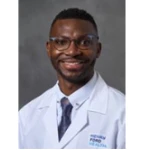Main Session

Sep
29
PQA 05 - Breast Cancer, International/Global Oncology
2997 - Radiotherapy Knowledge, Perceptions and Barriers among Medical Trainees and Healthcare Providers in Africa: A Survey-Based Study
Presenter(s)

Samuel Franck Seppo, MD - Henry Ford Health/Henry Ford Hospital, Detroit, MI
S. F. Seppo1, A. R. Bhatnagar2, M. S. Kitonga3, and L. N. Tangie4; 1Henry Ford Cancer Institute, Detroit, MI, 2Department of Radiation Oncology, Henry Ford Cancer Institute, Detroit, MI, 3Moi University College of Health Sciences, Eldoret, Kenya, 4Ministry of Public Health, Yaounde, Cameroon
Purpose/Objective(s):
Despite its critical role in cancer treatment, radiation oncology is often underrepresented in medical curricula worldwide, especially in African countries due to a lack of trained personnels and infrastructures. This study aimed to assess the understanding, perceptions, and obstacles surrounding radiotherapy education and awareness among medical trainees and healthcare professionals across Africa.Materials/Methods:
This was a cross-sectional online bilingual (English and French) survey distributed medical trainees and healthcare providers living in Africa. The survey was open from October 2024 to January 2025. We collected demographic data, current academic or professional status, details regarding prior exposure to radiation oncology, self-assessed knowledge in basic radiotherapy (on a 5-point scale: 1-2 = low, 3 = average, 4-5 = high), perceived importance of the field, and barriers identified were analyzed descriptively.Results:
88 participants completed the survey. The median age was 27 years [IQR: 24–30]; 54.5% were male and 45.5% female. Responders were mainly from Cameroon (69%). Other participants were from Kenya (9%), Nigeria (9%), and Egypt (5%). 53% of the participants were medical trainees (students, residents, postdoctoral researchers) and 47% were healthcare practitioners. Forty nine percent respondents (49%) had no prior exposure to radiation oncology, while 51% had some kind of prior exposure to radiation oncology. This was predominantly through lectures (76%) and clinical rotations (24%). Knowledge levels were self-rated as low (1–2: 77%), and only 23% rated their knowledge to be average or high. Sixty-nine percent (69%) deemed radiation oncology as "very important" in cancer care. Key barriers included lack of clinical work (75%), mentorship (49%), and career uncertainty in the field (30%). Only 36% felt confident discussing or referring patients for radiotherapy, while 92% advocated for additional training and collaboration from radiation oncology professionals.Conclusion:
This survey highlights significant gaps in knowledge and exposure to radiation oncology among medical trainees and healthcare providers in Africa. Targeted interventions, such as improved mentorship and increased clinical exposure, are crucial to strengthening education, fostering career interest in this promising field, and ultimately enhancing cancer care across the continent.